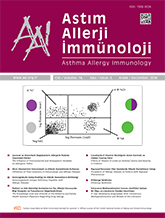


Objective: Drug hypersensitivity is an important problem because of its fatal consequences, prolonged hospitalization and increased treatment cost. In our study, we aimed to evaluate the knowledge level and attitude of the pediatrics and family health assistant physicians regarding drug hypersensitivity.
Materials and Methods: Pediatrics and family health assistant physicians in Ankara and Muğla were enrolled into the study. Physicians who accepted to participate in the study completed a survey form.
Results: 73.2% (n: 60) of the participating physicians were pediatrics assistants and 26.8% (n: 22) were family health assistants; thus a total of 82 assistants were included in the study. The average age was 27.54±1.75 (minimum-maximum: 25 – 33) years and 80.5% (n: 66) were female. 48.8% (n: 40) of the participants stated that they were encountering 1–2 drug allergy cases per month. Only 24.4% (n: 20) of them questioned drug allergy before prescribing. 80.5% (n: 66) of the participants stated that urticaria/angioedema emerging after drug administration is a type I hypersensitivity reaction and 81.7% (n: 67) claimed that anaphylaxis is a type I hypersensitivity reaction. We observed that patients diagnosed with vasovagal syncope after parenteral drug administration were diagnosed with anaphylaxis by 54.9% (n: 45) of the participants.
Conclusion: Increasing the awareness about drug allergies will enable early intervention, proper selection of alternative drug treatment, and prevention of the mortality and morbidity. Physicians should be educated about drug allergies, in order to increase their knowledge to a satisfactory level.